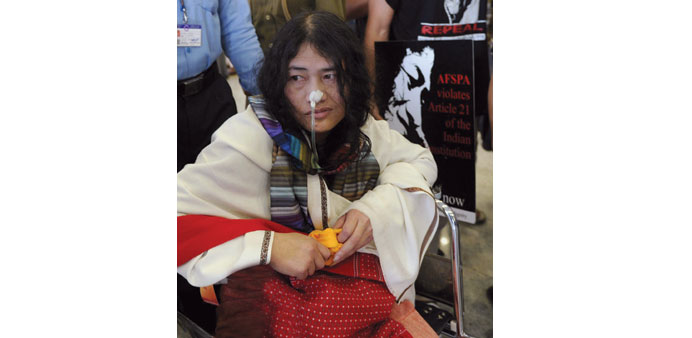Agencies/Imohal, Manipur
A court yesterday ordered the release of a woman who has staged a 14-year-long hunger strike to protest against human rights abuses in the country’s remote northeast, her lawyer said.
Irom Sharmila, known as the Iron Lady of Manipur for her unwavering and non-violent protest, has spent years in judicial custody over her fast, intended to draw attention to abuses allegedly committed by the military.
“The court has set her free,” lawyer Mani Khaidem said of Sharmila, who was arrested on charges of trying to commit suicide shortly after beginning her protest.
“The court said that it is just an allegation that she wants to commit suicide, hence she cannot be kept under arrest and should be released immediately,” Singh said in Imphal, capital of Manipur state.
Sharmila began her fast in November 2000 after witnessing the killing of 10 people by the army at a bus stop in Malom, near her home in northeastern Manipur, which is subject to the draconian Armed Forces Special Powers Act (AFSPA).
The incident, known as the “Malom Massacre,” was allegedly committed by the Assam Rifles, one of the paramilitary forces operating in the state. The victims included Leisangbam Ibetombi, a 62-year-old woman, and 18-year-old Sinam Chandramani, a 1988 National Child Bravery Award winner.
Sharmila was arrested a few days later and was then sent to a prison hospital, where she has been force-fed via a nasal drip several times a day.
Her brother Irom Singhajit welcomed the court’s decision, but said he feared she would be rearrested once released because she would never abandon her protest.
“Until and unless the AFSPA is repealed, she is going to continue her protest,” Singhajit said.
“That is what I fear. Even if she is released, she will be arrested again within a day or two,” he said.
Over the years, Sharmila has been released from custody, only to be rearrested a few days later from her home in Manipur.
Due to her ill health, Sharmila is currently lodged in a special ward of the Jawaharlal Nehru Institute of Medical Sciences in Imphal where one room, where she is confined, has been declared a sub-jail.
Sharmila, looking frail and with a drip hanging from her nose, has also regularly appeared in court where she has been asked whether she was ready to end her fast.
An activist and poet, Sharmila has always replied no, and, flanked by police officers, been returned to custody.
Babloo Loitangbam, a human rights activist in the northeast who is close to Sharmila, said the court had now accepted that the charge of attempting suicide was not sustainable.
“Sharmila is not trying to take her life, she is trying to make a political point which is to repeal the Armed Forces Special Powers Act,” he told the NDTV network.
But Loitangbam said he too feared that she would be rearrested once the state government appealed to the high court against the lower court’s decision.
Sharmila, who has been described by Amnesty International as a prisoner of conscience, also faces similar charges in New Delhi, where she has staged a hunger-strike in the past.
She told a court in Delhi in May that she was pinning her hopes on new Prime Minister Narendra Modi, whom she urged to repeal the controversial act.
“I love my life... I also want to live life as others, but only after this draconian law is removed,” she told the packed court.
“I will never stop my struggle until this law is repealed completely. I have many hopes from Mr Modi.”
The act, which covers large parts of northeastern India and Kashmir, gives Indian forces sweeping powers to search, enter property and shoot on sight, and is seen by critics as cover for human rights abuses.

